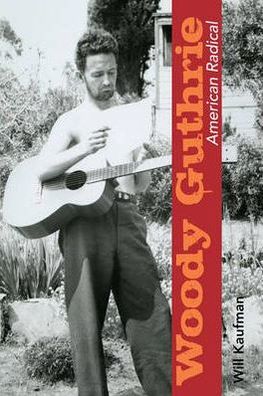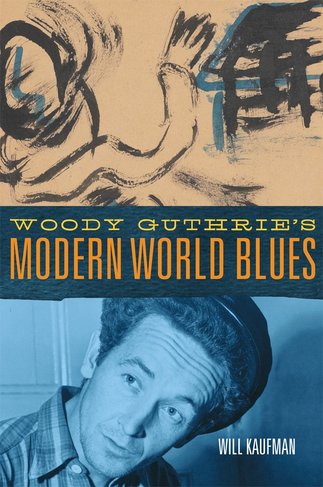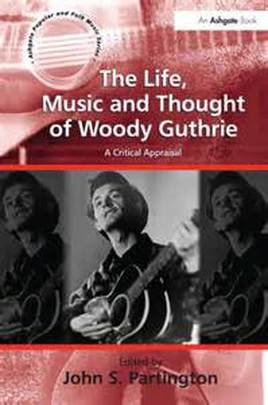Books
Mapping Woody Guthrie
(University of Oklahoma Press, 2019)
“I ain’t got no home, I’m just a-roamin’ round,” Woody Guthrie lamented in one of his most popular songs. A native of Oklahoma, he was still in his teens when he moved to Pampa, Texas, where he experienced the dust storms that would play such a crucial role in forming his identity and shaping his work. He later joined thousands of Americans who headed to California to escape the devastation of the Dust Bowl. There he entered the West Coast stronghold of the Popular Front, whose leftward influence on his thinking would continue after his move in 1940 to New York, where the American folk music renaissance began when Guthrie encountered Pete Seeger and Lead Belly.
Guthrie kept moving throughout his life, making friends, soaking up influences, and writing about his experiences. Along the way, he produced more than 3,000 songs, as well as fiction, journalism, poetry, and visual art, that gave voice to the distressed and dispossessed. In this insightful book, Will Kaufman examines the artist’s career through a unique perspective: the role of time and place in Guthrie’s artistic evolution.
Guthrie disdained boundaries—whether of geography, class, race, or religion. As he once claimed in his inimitable style, “There ain’t no such thing as east west north or south.” Nevertheless, places were critical to Guthrie’s life, thought, and creativity. He referred to himself as a “compass-pointer man,” and after his sojourn in California, he headed up to the Pacific Northwest, on to New York, and crossed the Atlantic as a merchant marine.
Before his death from Huntington’s disease in 1967, Guthrie had one more important trip to take: to the Florida swamplands of Beluthahatchee, in the heart of the South. There he produced some of his most trenchant criticisms of Jim Crow racism—a portion of his work that scholars have tended to overlook.
To map Guthrie’s movements across space and time, the author draws not only on the artist’s considerable recorded and published output but on a wealth of unpublished sources—including letters, essays, song lyrics, and notebooks—housed in the Woody Guthrie Archives in Tulsa, Oklahoma. This trove of primary documents deepens Kaufman’s intriguing portrait of a unique American artist.
“Mapping Woody’s travels as a way of revealing the impact of time and place on his work is a journey few are qualified to undertake. The reader is in good hands as Will Kaufman guides us along Woody’s road and his path across the seas to explore the places and spaces that inspired America’s greatest balladeer.”
—Deana McCloud, Executive Director, Woody Guthrie Center
“We always knew Woody was a ‘travelin’ man,’ but Will Kaufman shows us so much more. Movement across space and through time enriched Guthrie by providing him—and by extension, us—the multiple vantage points through which to view and understand America at mid-twentieth century. Our preeminent Woody Guthrie scholar delivers yet again.”
—Brian Hosmer, H. G. Barnard Chair of Western American History, University of Tulsa
Woody Guthrie, American Radical
(University of Illinois Press, 2011)
Will Kaufman's Woody Guthrie, American Radical reclaims the politically radical profile of America's greatest balladeer. Although he achieved a host of national honors and adorns US postage stamps, and although his song "This Land Is Your Land" is often considered the nation's second national anthem, Woody Guthrie committed his life to the radical struggle.
Kaufman traces Guthrie's political awakening and activism throughout the Great Depression, World War II, the Cold War, the Korean War, the Civil Rights struggle, and the poison of McCarthyism. He examines Guthrie's role in the development of a workers' culture in the context of radical activism spearheaded by the Communist Party of the USA, the Popular Front, and the Congress of Industrial Organizations. Kaufman also establishes Guthrie's significance in the perpetuation of cultural front objectives into the era of the "New Left" and beyond, particularly through his influence on the American and international protest song movement.
Utilizing a wealth of previously unseen archival materials such as letters, song lyrics, essays, personal reflections, photos, and other manuscripts, Woody Guthrie, American Radical introduces a heretofore unknown Woody Guthrie: the canny political strategist, fitful thinker, and cultural front activist practically buried in the general public's romantic celebration of the "Dust Bowl Troubadour."
(University of Illinois Press, 2011)
Will Kaufman's Woody Guthrie, American Radical reclaims the politically radical profile of America's greatest balladeer. Although he achieved a host of national honors and adorns US postage stamps, and although his song "This Land Is Your Land" is often considered the nation's second national anthem, Woody Guthrie committed his life to the radical struggle.
Kaufman traces Guthrie's political awakening and activism throughout the Great Depression, World War II, the Cold War, the Korean War, the Civil Rights struggle, and the poison of McCarthyism. He examines Guthrie's role in the development of a workers' culture in the context of radical activism spearheaded by the Communist Party of the USA, the Popular Front, and the Congress of Industrial Organizations. Kaufman also establishes Guthrie's significance in the perpetuation of cultural front objectives into the era of the "New Left" and beyond, particularly through his influence on the American and international protest song movement.
Utilizing a wealth of previously unseen archival materials such as letters, song lyrics, essays, personal reflections, photos, and other manuscripts, Woody Guthrie, American Radical introduces a heretofore unknown Woody Guthrie: the canny political strategist, fitful thinker, and cultural front activist practically buried in the general public's romantic celebration of the "Dust Bowl Troubadour."
"Overdue rediscovery of folk music’s great agitator." - Kirkus Reviews
"A fascinating look at Woody Guthrie's politics." - MOJO
"The writer of 'This Land Is Your Land' wasn't just a songwriter - Guthrie committed himself to radical political struggle. Discover more in this handsome, elegantly compiled tome." - New Musical Express
"Drawing on previously unseen letters, song lyrics, essays, and interviews with family and friends, Kaufman traces Guthrie's involvement in the workers' movement and his development of protest songs. He portrays Guthrie as a committed and flawed human immersed in political complexity and harrowing personal struggle." - Library Journal
"Kaufman is an excellent guide to a tradition buried under a multi-decade propaganda campaign that buried the stories of rural and radical America." - PopMatters
"As Will Kaufman argues in his wonderful and uncompromising book, the folksinger was not driven by some abstract commitment to justice alone, but by the vision of a cooperative planned economy, one that could meet people’s needs directly and foster meaningful social, economic, and racial equality." - Monthly Review
"Depp and I love your book!" - Douglas Brinkley, co-editor, with Johnny Depp, of Woody Guthrie's House of Earth (2012)
Woody Guthrie's Modern World Blues
(University of Oklahoma Press, 2017)
Mention Woody Guthrie, and people who know the name are likely to think of the “Okie Bard,” dust storms behind him, riding a boxcar or walking a red-dirt road, a battered guitar strapped to his back. But unlock Guthrie from the confines of rural folk and Hollywood mythology, as Will Kaufman does here, and you’ll find an abstract painter and sculptor who wrote about atomic energy and Ingrid Bergman and developed advanced theories of dialectical materialism and human engineering—in short, a folk singer who was deeply engaged with the art, ideas, and issues of his time.
Guthrie may have been born in the Oklahoma hills, but his most productive years were spent in the metropolitan centers of Los Angeles and New York. Machines and their physics were among his favorite metaphors, fast cars were his passion, and airplanes and even flying saucers were his frequent subjects. His career-long immersion in radio, recording, and film inspired trenchant observations concerning mass media and communication, and he contributed to modern art as a prolific abstract painter, graphic artist, and sculptor.
This book explores how, through multiple artistic forms, Guthrie thought and felt about the scientific method, atomic power, and war technology, as well as the shifting dynamics of gender and race. Drawing on previously unpublished archival sources, Kaufman brings to the fore what Guthrie’s insistently folksy popular image obscures: the essays, visual art, letters, verse, fiction, and voluminous notebook entries that reveal his profoundly modern sensibilities.
Woody Guthrie emerges from these pages as a figure whose immense artistic output reflects the nation’s conflicted engagement with modernity. Capturing the breathtaking social and technological changes that took place during his extraordinarily productive career, Woody Guthrie’s Modern World Blues offers a unique and much-needed new perspective on a musical icon.
(University of Oklahoma Press, 2017)
Mention Woody Guthrie, and people who know the name are likely to think of the “Okie Bard,” dust storms behind him, riding a boxcar or walking a red-dirt road, a battered guitar strapped to his back. But unlock Guthrie from the confines of rural folk and Hollywood mythology, as Will Kaufman does here, and you’ll find an abstract painter and sculptor who wrote about atomic energy and Ingrid Bergman and developed advanced theories of dialectical materialism and human engineering—in short, a folk singer who was deeply engaged with the art, ideas, and issues of his time.
Guthrie may have been born in the Oklahoma hills, but his most productive years were spent in the metropolitan centers of Los Angeles and New York. Machines and their physics were among his favorite metaphors, fast cars were his passion, and airplanes and even flying saucers were his frequent subjects. His career-long immersion in radio, recording, and film inspired trenchant observations concerning mass media and communication, and he contributed to modern art as a prolific abstract painter, graphic artist, and sculptor.
This book explores how, through multiple artistic forms, Guthrie thought and felt about the scientific method, atomic power, and war technology, as well as the shifting dynamics of gender and race. Drawing on previously unpublished archival sources, Kaufman brings to the fore what Guthrie’s insistently folksy popular image obscures: the essays, visual art, letters, verse, fiction, and voluminous notebook entries that reveal his profoundly modern sensibilities.
Woody Guthrie emerges from these pages as a figure whose immense artistic output reflects the nation’s conflicted engagement with modernity. Capturing the breathtaking social and technological changes that took place during his extraordinarily productive career, Woody Guthrie’s Modern World Blues offers a unique and much-needed new perspective on a musical icon.
“In Woody Guthrie’s Modern World Blues, Will Kaufman reveals Woody Guthrie as he most likely understood himself: modern, experimental, and, overall, fiercely progressive. This book brings Guthrie scholarship out of the dark ages and into the future by revealing the depth and complexity of Guthrie’s thinking about topics such as science, technology, media, politics, gender, and race, and thereby providing a more dynamic understanding of twentieth-century history and culture. Like Guthrie’s own work, Kaufman’s writing is clever, generous, and accessible, and whether you’re a fan or a detractor, it will entirely change the way you think about ‘folk’ music and its possibilities.”--Edward Comentale, author of Sweet Air: Modernism, Regionalism, and American Popular Music
Book Chapters
"Woody Guthrie and the Cultural Front," pp. 35-50
"Woody Guthrie at the Crossroads," pp. 77-93
Journal Articles
“Woody Guthrie’s Union War.” Hungarian Journal of English and American Studies, 16, nos. 1-2 (2010): pp. 109-124.
“Woody Guthrie and the Occupy Movement.” American Music Review (2012), 41, no. 2: pp. 1-4, 14. http://www.brooklyn.cuny.edu/web/academics/centers/hitchcock/publications/amr/v41-2/kaufman.php
"Woody Guthrie, 'Old Man Trump,' and a Real Estate Empire's Racist Foundations." The Conversation, January 21, 2016: http://theconversation.com/woody-guthrie-old-man-trump-and-a-real-estate-empires-racist-foundations-53026
"In Another Newly Discovered Song, Woody Guthrie Continues His Assault on 'Old Man Trump'." The Conversation, September 6, 2016: http://theconversation.com/in-another-newly-discovered-song-woody-guthrie-continues-his-assault-on-old-man-trump-64221
“Woody Guthrie’s Songs against Franco.” Atlantis: Journal of the Spanish Association for Anglo-American Studies, 39, no. 1 (2017): pp. 91-111. http://www.atlantisjournal.org/index.php/atlantis/article/view/349/214
“The Misguided Attacks on 'This Land Is Your Land'." The Conversation, August 20, 2019: https://theconversation.com/the-misguided-attacks-on-this-land-is-your-land-121169





